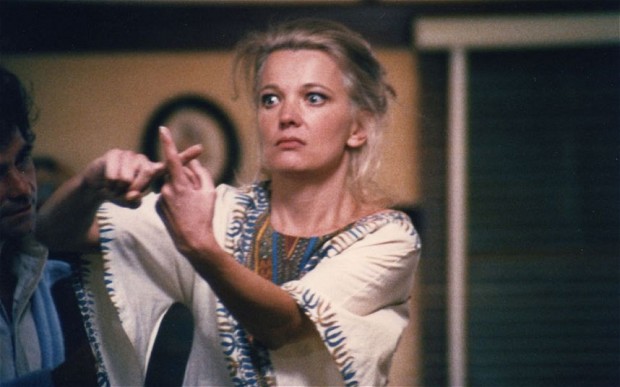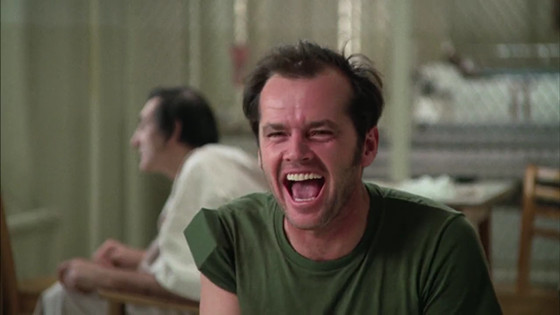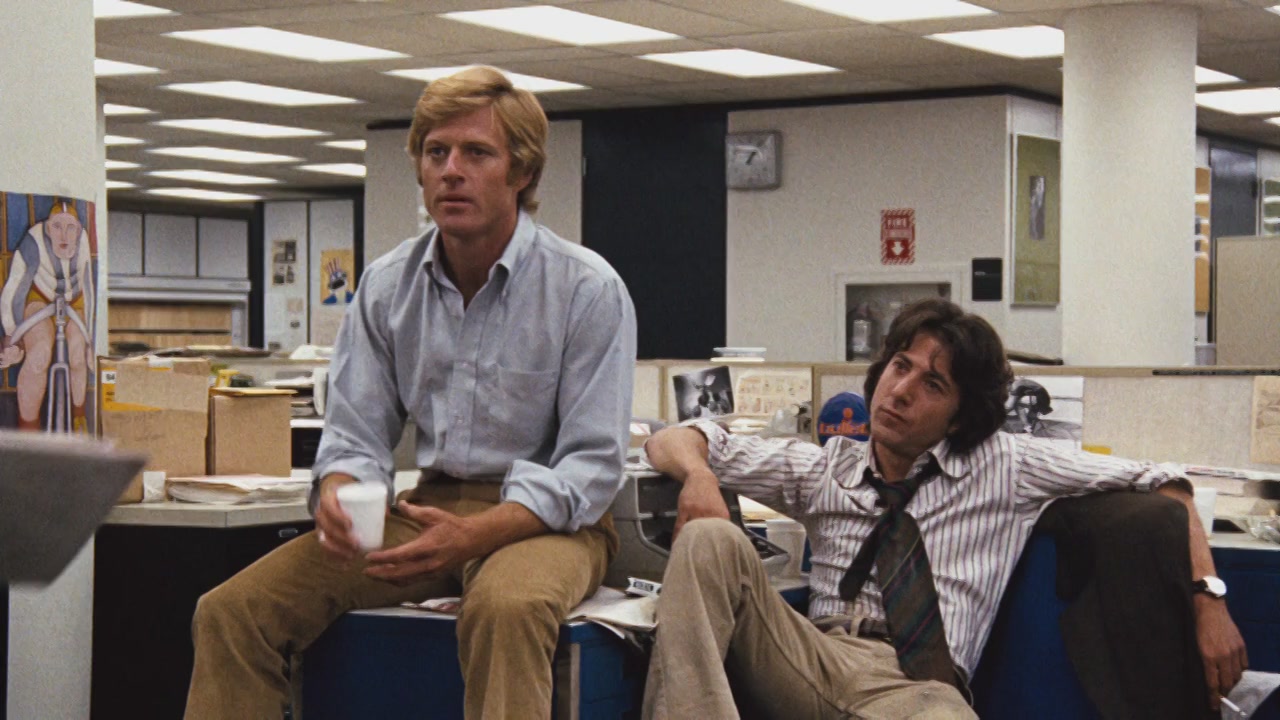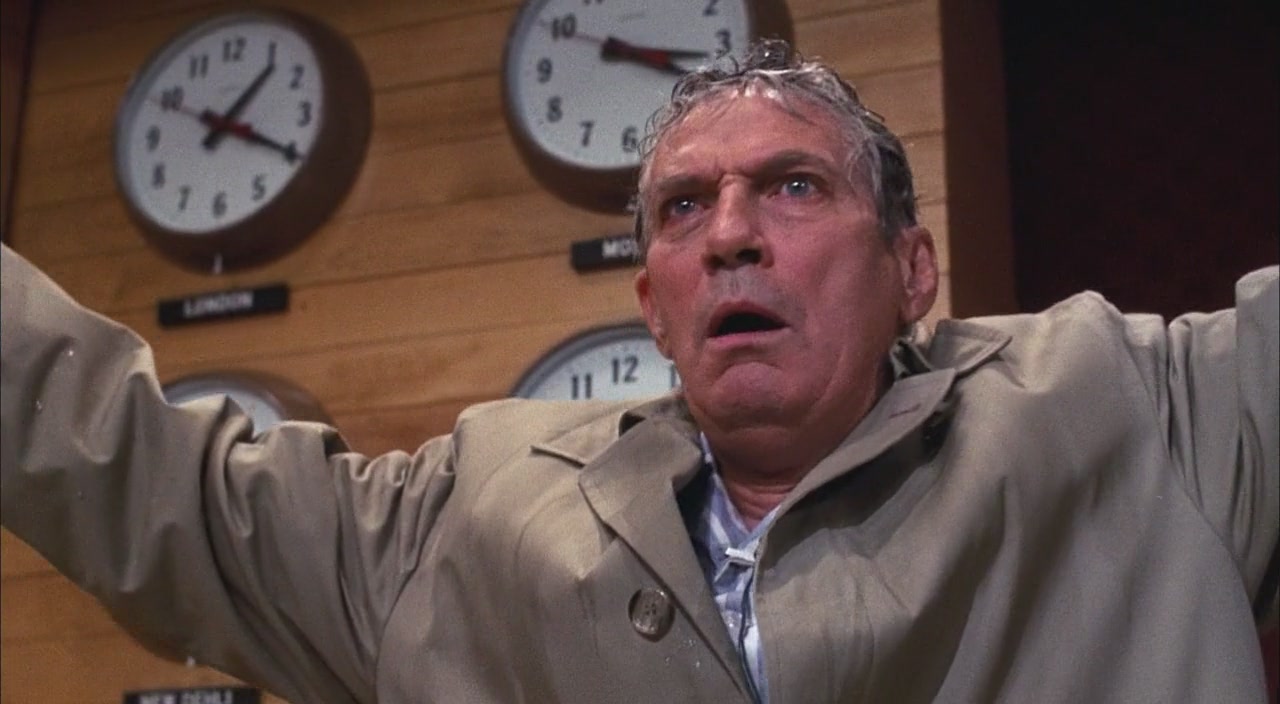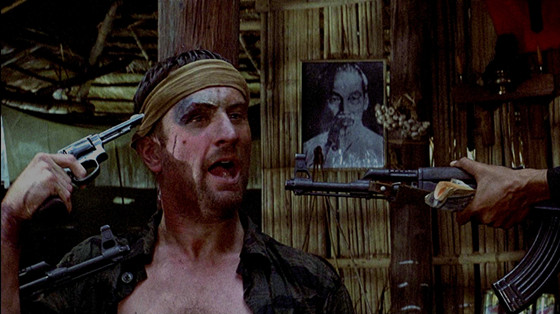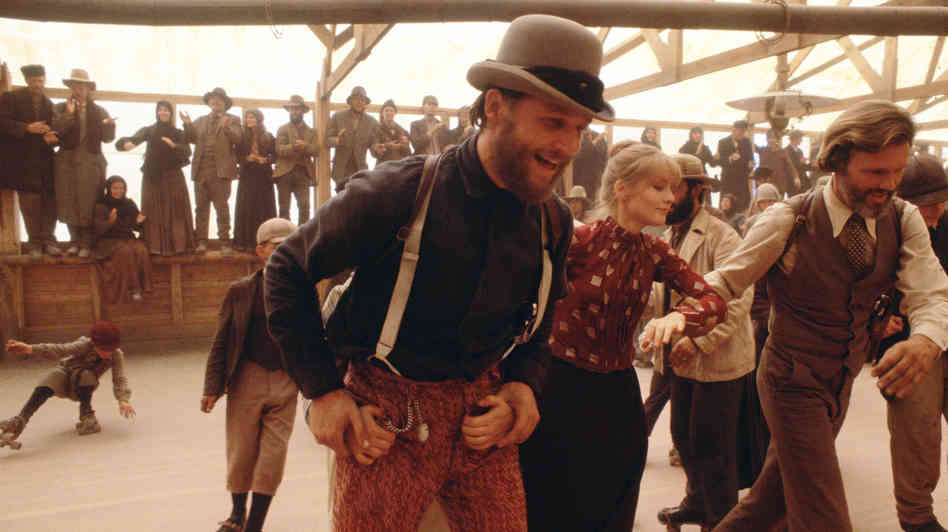14. A Woman Under The Influence (John Cassavetes – 1974)
Whilst John Cassavetes had been at the forefront of American independent filmmaking for more than a decade before the seventies even began, his A Woman Under The Influence might in fact be his magnum opus and starred his wife and frequent collaborator Gena Rowlands, who gives a true tour-de-force performance as a housewife becoming unhinged.
The film tells the story of Mabel Longhetti (Gena Rowlands), a suburban housewife, mother of three and wife to Nick (Peter Falk), a construction worker. The couple love each other but also seem to be polar opposites and slowly but surely the strain of marital life and domesticity starts unravel Mabel’s already unstable mental wellbeing.
After a nervous breakdown Nick decides to have his wife institutionalised but when she returns after six months of treatment neither Mabel or Nick appear to be emotionally ready and soon it’s clear that nothing much has changed.
John Cassavetes initially wrote A Woman Under The Influence as a stage play but as his wife realised it was too intense to be performed several times a week, he decided to adapt it to a screenplay instead.
The film is a scathing attack on the constricting role of so many women as housewives and the stifling pressures associated with having to be the perfect mother and wife as well as society’s demands to confirm. Perfectly in tune with the women’s liberation movement of the time, the movie voiced the opinion of a generation in a harrowing and unforgettable way.
15. One Flew Over the Cuckoo’s Nest (Milos Forman – 1975)
Based on the 1962 same name novel by Ken Kesey, One Flew Over the Cuckoo’s Nest features another iconic seventies performance by Jack Nicholson, which landed him his first Oscar for Best Actor and arguably made him the definitive “face” of seventies American New Wave cinema.
Utterly captivating and much beloved, One Flew Over the Cuckoo’s Nest is the story of a free spirit (Jack Nicholson) who, in order to avoid jail, ends up in a mental institution where he proceeds to have a battle of wills with the authoritarian head nurse Ratched (Louise Fletcher) who insists on conformity. Both leads give outstanding performances as does the entire supporting cast, which includes Brad Dourif, Scatman Crothers, Christopher Lloyd, Will Sampson and Danny DeVito.
A thinly disguised metaphor for the disillusionment with authority in the wake of the Vietnam war and the Watergate scandal, the independently produced film became a massive hit in 1975 and a breakthrough for Czech director Milos Forman in the United States.
It was also the second film ever to walk away with all five Academy Awards (Best Film, Director, Actor, Actress and Screenplay) and only one of three movies to have ever achieved that feat (the others were It Happened One Night and The Silence of the Lambs).
16. All the President’s Men (Alan J. Pakula – 1976)
Dealing with the uncertainties of the day and the scepticism in regards to politicians and authority, All the President’s Men was an adaptation of the novel of the same name by journalists Carl Bernstein and Bob Woodward, which examined the infamous Watergate scandal and led to the only resignation of a U.S. President ever.
After burglars have been arrested at the Democratic National Committee headquarters, journalist Bob Woodward (Robert Redford) is sent to court to cover the story. He finds out that the men and their lawyer have CIA ties and upon returning to the office he’s teamed up with Carl Bernstein (Dustin Hoffman), another journalist who has been looking into the story.
The men initially don’t like working together but nonetheless form a good team. Encouraged to look into the affair deeper by their executive editor (Jason Robards), the two journalists start uncovering a far-reaching conspiracy and their work will ultimately change the course of history.
Presented as a realistic political thriller, All the President’s Men perfectly embodied the general feelings of disillusion and scepticism of the seventies, where people had lost faith in their leaders and most forms of authority. The film manages to remain suspenseful, even though the outcome is known by all, by strictly focusing on the investigation of Woodward and Bernstein and never on the actual people they are investigating.
Additionally the film also manages to somewhat present its audience with a “happy” ending by showing the journalists as victorious although the implications of them being right ultimately cast a dark shadow on the political landscape and only confirm the public’s fears to view those in power with suspicion. All the President’s Men was nominated for eight Oscars, including Best Picture and Director, ultimately taking home four of them.
17. Network (Sidney Lumet – 1976)
If you have never seen Network, scrap your plans tonight and watch this magnificent piece of 1970’s satire. A film which was far ahead of its time, Network is completely relevant today in the way it attacks corporate power and the way television is used as a blatant propaganda tool.
Network executive Max (William Holden) and news anchor Howard Beale (Peter Finch) have been long time friends. The movie starts with with Howard being told he will be taken off the air as he is no longer relevant. As a result Howard announces on air the next day that he will kill himself on the show in a week’s time as he has nothing further to live for.
As this announcement causes the show’s ratings to go through the roof, ambitious executive Diana (Faye Dunaway) talks the ruthless head of the network (Robert Duvall) into keeping Howard on. Meanwhile Howard gets more and more unstable as his shows gains a huge following and he becomes the “Mad Prophet of the Airwaves”. His phrase “I’m mad as hell and I am not going to take it any more” has become a part of popular culture.
Featuring a killer screenplay, tight direction and fantastic performances from all involved, Network was a giant hit and received ten Oscar nominations, winning four of them: Best Screenplay, Best Actor (the first to be ever granted posthumously as Peter Finch died before the Oscar ceremony), Best Actress and Best Supporting Actress plus a string of other awards from various other ceremonies.
Sidney Lumet’s Network is simply a towering achievement and one of the best movies to come out of Hollywood in the 1970’s.
18. Taxi Driver (Martin Scorsese – 1976)
Often cited as one of the best American films ever made and certainly one of the best films ever directed by Martin Scorsese, Taxi Driver further explored the sense of decay that prevailed throughout the seventies and turned both its star and director into leading figures in American cinema.
Travis Bickle (Robert De Niro) is an unhinged young man and Vietnam vet who drives a cab at night in New York. Unable to relate to anyone, all he seems to see around him is a cesspool of moral decay. Slowly but surely his thoughts become more violent and he starts a vigorous training program to get into shape, buys a gun and starts having vigilante-type fantasies to cleanse the city of its scum.
He becomes obsessed over blonde presidential campaign worker Betsy (Cybill Shepherd) but once she rejects him after he takes her to see a Swedish educational sex film on their first date, Travis becomes even further unhinged. He then plans to assassinate Betsy’s presidential candidate but when his attempt fails he sets his sights on saving a teen prostitute (Jodie Foster), whom he had met earlier and tried to persuade to quit her job, from her violent pimp (Harvey Keitel) leading to the film’s explosive climax.
Released after the real-life assassination attempt on President Ford, the Vietnam war and the Watergate scandal and set in world which had seemed to have lost all its sense of morality, Taxi Driver was perfectly in tune with the prevailing mindset of the time and turned into a great critical as well as commercial success despite the fact that the studio had some serious doubts about the bleak and violent tone of the film before they released it.
It went on to win the Palme d’Or at Cannes and has remained one of the most celebrated and influential American films ever made.
19. The Deer Hunter (Michael Cimino – 1978)
The Deer Hunter was one of the first films in which Hollywood started dealing directly with the Vietnam war, a conflict which had not really been addressed in mainstream cinema yet. Together with Coming Home, which was released the same year and which was one of the movies to compete with The Deer Hunter for Best Picture at the Academy Awards, and Apocalypse Now, which was released the following year, the movie opened the floodgates for films dealing with this touchy subject.
The movie follows a group of friends from a small steelworker’s town in Pennsylvania as some of them are about to go off to war in Vietnam. The film starts off with the wedding celebration of Steve (John Savage) and a final deer hunt before he, Mike (Robert De Niro) and Nick (Christopher Walken) are shipped off to Vietnam. Once there we follow the men as they have been captured by the Vietcong and are forced to participate in brutal games of Russian roulette. The friends manage to escape but Nick gets separated from the other two whilst doing so.
Their war experiences have deeply traumatic effects on all of them as Steve loses his legs and becomes partially paralysed, a severely psychologically damaged Nick remains behind in Saigon and Mike becomes a changed man. When it comes to Mike’s attention after he and Steve have made it back to the U.S. that Nick might still be alive in Saigon, he decides to go find him and bring his old friend home.
Michael Cimino’s second feature is an epic three hour film examining the effects of war on both the men who go off to fight them and their loved ones who remain behind. Featuring a fantastic cast which also included Meryl Streep, John Cazale and George Dzundza, the film clearly echoed the general ambivalence felt about the Vietnam war and the disillusionment experienced in its wake.
The film was released for one week in December 1978 to make it eligible for the Oscars and the strategy worked wonders as the movie was nominated for nine Academy Awards, ultimately winning five, including Best Picture and Director. The movie was then re-released on a wider scale and, due to the Oscar buzz surrounding it, became a huge financial success.
This gave director Michael Cimino virtually full financial and artistic freedom to make his next feature, Heaven’s Gate, which would basically end the New Hollywood era.
20. Heaven’s Gate (Michael Cimino – 1980)
Written and directed by Michael Cimino, Heaven’s Gate is a notorious film as it was a critical and, maybe more importantly, a huge financial failure, which single-handedly caused its studio to go bankrupt.
It basically also killed Michael Cimino’s career, who had been a critical favourite two years earlier with the Deer Hunter, made westerns unpopular for at least a decade and is often cited as being the film that ended the New Hollywood era as studios were no longer willing to take artistic and financial risks, increased their control over their productions and started putting all their bets on big summer blockbusters instead.
Loosely based on the Johnson County war, the film follows the struggles of poor European immigrants against rich cattle barons, representing the rise of capitalism in the United States around the 1890s. Wealthy land baron Frank Canton (Sam Waterston) plans to kill 125 poor settlers as he accuses them of being thieves and to consolidate the power of his syndicate.
He hires Nate Champion (Christopher Walken) as his main enforcer, who happens to be friends with the idealistic county marshal Jim Averill (Kris Kristofferson), who is caught between the the two sides although his sympathies clearly verge towards the immigrants. To complicate matters even further Averill and Champion both have their eyes on bordello madam Ella Watson (Isabelle Huppert). As tensions rise, both the love triangle and the conflict between the barons and settlers will explode into violence.
Still seen in some circles as one of the worst movies ever made, this couldn’t be any further from the truth. Whilst there is no doubt that director Cimino produced a self-indulgent and unwieldy behemoth, which was a huge financial disaster, the film is also a stunning a piece of work.
Huge in scope and virtually unrivalled in regards to period detail, the movie also features an extraordinary cast, which includes John Hurt, Jeff Bridges, Brad Dourif, Joseph Cotton, Richard Masur, Terry O’Quinn and Mickey Rourke, a wonderful score and stunning cinematography by Vilmos Zsigmond.
Whilst its troubled production, over-indulgent director and financial failure may have tainted the critics’ and audiences’ views at the time, Heaven’s Gate comes highly recommended and might in fact be one of cinema’s most under-appreciated masterpieces.
Author Bio: Emilio has been a movie buff for as long as he can remember and holds a Masters Degree in Cinema Studies from the University of Amsterdam. Critical and eclectic in taste, he has been described to “love film but hate all movies”. For daily suggestions on what to watch, check out his Just Good Movies Facebook page: https://www.facebook.com/goodmoviesuggestions.
